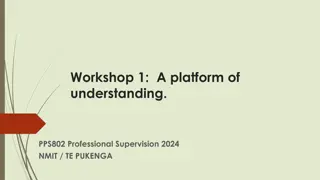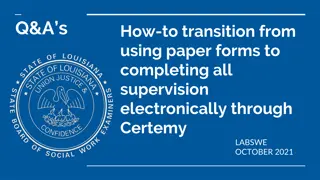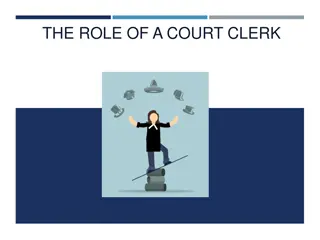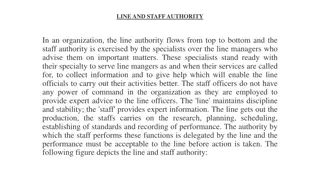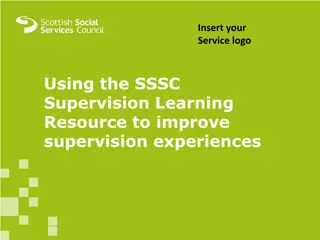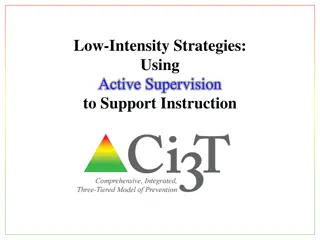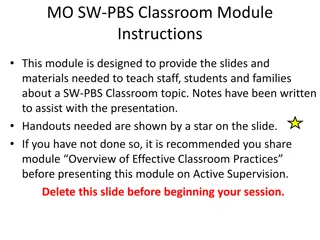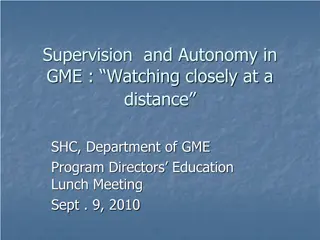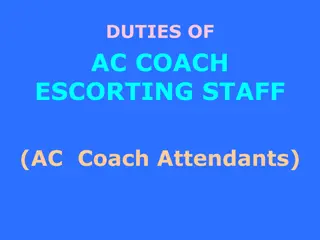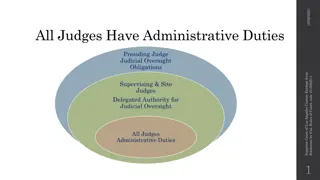Effective Supervision of Court Staff - Duties and Responsibilities
Introduction to the effective supervision of court staff, outlining the duties and responsibilities of different roles such as readers, stenographers, computer operators, and muharirs in a judicial setting. The process of supervision helps ensure smooth operations and efficient dispensation of justice to litigants.
Download Presentation

Please find below an Image/Link to download the presentation.
The content on the website is provided AS IS for your information and personal use only. It may not be sold, licensed, or shared on other websites without obtaining consent from the author. Download presentation by click this link. If you encounter any issues during the download, it is possible that the publisher has removed the file from their server.
E N D
Presentation Transcript
EFFECTIVE SUPERVISION OF COURT STAFF
INTRODUCTION Supervision is a process by which court officials/ officers are helped to learn according to the needs and requirements of their job/duty and to make the best use of their knowledge and skills which is helpful in dispensation of justice to the litigants.
DETAIL OF COURT STAFF 1. Assistant/Senior Clerk/Reader (BPS 16/14) 2. Computer Operator (BPS-16) 3. Senior and Junior Scale Stenographer (BPS- 16/14) 4. Junior Clerk/Muharrir (BPS- 11) 5. Naib Qasid (BPS-5)
DUTIES OF STAFF ATTACHED READER (i) The reader performs the following duties: (ii) Preparation of daily cause list and affixing the same on notice board. (Since, CFMS is being operative in District Mansehra, so the reader is responsible for maintaining CFMS generated cause list). (iii) The reader is also responsible for giving Parcha Yadasht and to give information to the parties and witnesses regarding the next date of hearing. (iv) Maintenance of Peshi Register, appointment of local commission register, return of plaint register, fine register, judicial fine register, stock register etc Entering the cases in CFMS and scanning the running files of attendance and arguments.
SENIOR AND JUNIOR SCALE STENOGRAPHER Typing of judgments & orders, recording of evidence, any other assignment given by the Presiding Officer and scanning and uploading the files fixed for evidence alongwith statements of the witnesses and documents exhibited during evidence.
COMPUTER OPERATORS Typing of judgments and orders, recording of evidence, preparation of chronological list, disposal proforma and scanning/uploading the files in CFMS. He is also overall incharge of CFMS/scanning related work of the court.
MUHARRIR (i) He is responsible for issuance of process as per direction of the court Maintenance of all Civil, Criminal & Miscellaneous registers for the cases. (ii) Transmission of record to High Court and checking of from the High Court. (iii) Sending the file transferred out and receiving the files transferred in. (iv) Preparation of decree sheet etc and consigning of files to Record Room. (v) Preparation of weekly, fortnightly, monthly and quarterly reports as well as providing data to the High Courts. (vi) He is also responsible for scanning all the pending file, entering the newly instituted files in CFMS and also to scan the decided files. entering record received
NAIB QASID 1. Cleanliness of the courtroom. 2. Cleanliness of the premises of the courtroom. 3. Calling of cases. 4. Transmission of files, letters, release warrants etc to the concerned places/courts.
WAYS TO MONITOR PROGRESS (i) Getting feedback from all the court staff members. (ii) Giving tasks to court staff members and evaluating the quality of work. (iii) Keeping close eye on each of the staff member attached in the court and his behavior towards the litigants. (iv) Having regular one to one meeting with every staff member attached in the court. (v) Maintaining such an environment in the court so that your sub-ordinate staff members can express their problems faced by them in discharge of their official duties. (vi) As a leader, it is essential for every Judicial Officer to deliver clear instruction to the staff members as per their job description. (vii) Some of the staff members are difficult to deal with and their behavior can affect the whole team work. Such a problematic staff member should be dealt with tactics and while making effective supervisory policy.
WORKLOAD MANAGEMENT Work Load Management is the process of efficiently distributing and managing work amongst the court staff members. The Daily Diary/Peshi Register maintained by reader of the court is the backbone of work load management inside the court. If a huge number of cases fixed for a day without any priorities and without adopting any strategy then the Presiding Officer will not be able to give time to each and every case fixed for that day and the same will be adjourned mechanically and by this way Presiding Officer will also not be able to give time to other court related work.
CONFLICT MANAGEMENT When there is conflict amongst the court staff, it should not be ignored. Turning a blind eye could lead to a negative atmosphere in the court which could have implications for staff productivity and communication amongst the team members. When an issue arises amongst the court staff, it is necessary that the same be addressed straight away before it builds.
ACKNOWLEDGEMENT OF GOOD WORK The court staff members will look to you for guidance and inspiration, so it is essential that you should set a good example to gain their respect. Acknowledgment of good work will help the court staff members to build confidence and to remain more involved in performing of their official duties. So it is vital that you should acknowledge the good work of a sub- ordinate staff member.











